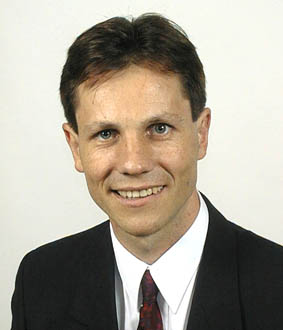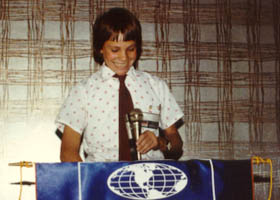The Institute of Advanced
Leadership's Home Page / IOAL's
Trainers/Facilitators
IOAL's Trainers / Facilitators:
The Institute of Advanced Leadership have a large number
of Full-time and Associate Trainers / Facilitators with a combined
experience of well over 70 years of corporate training in
Australia, U.K., U.S.A., H.K., N.Z., France, China, Taiwan,
Uganda, Rwanda and many other countries. They each bring their own
unique style, background, experience and areas of expertise to any
program they run or assist on.
The common thread in all of our trainers is a love of people
and a desire to help people grow and seek the best in themselves,
in their performance, and their ability to serve both internal and
external customers.
Our successful corporate and strategic backgrounds allow us to
facilitate in a style that is down-to-earth, genuine, and
enjoyable, while still being authoritative and powerful.
Our commitment is to creating attitudinal, skills and
behavioural improvements which translate into bottom line
results.
 What people are saying about our
training programs
What people are saying about our
training programs
Depending on your needs we
are likely to be able to find the perfect trainer for
you.
Rather than just writing a
few lines on each of our trainers, we have chosen to feature one of
the trainers to give you a more in-depth example of the type of
background and skills we provide.
Our Principal Trainer & Consultant,
Tony Lenart:

Our Principal Trainer & Consultant, Tony Lenart
B.Bus, Co. Dir. Dip, Dip. Training
& Assessment, Dip. Frontline Mgmt, Dip. Ther., FAICD,
AFAIM, AFAMI, ASA
|
Business Experience:
* Executive Chairman, Institute of Advanced
Leadership (International)
* Regional Director (Africa), World University of
Leadership
* Principal, The Added Value Creators
* Chief Executive (A'g) - St. Vincent de Paul
Society.
(One of Australia's largest 150 companies,
and its largest N.G.O. (Charity).)
* Business Manager - C.I.G. (previously Sales &
Marketing Manager).
* Sales Manager - McMillan Publishers (previously Sales
Representative).
* Trainee Manager - T.N.T.
Appointments include:
* Chairman - The Hunger Project (Australia) Ltd
* Chairman - Marketing Board - St Vincent de Paul Society
(SVDP)
* Chairman - Outreach Committee - Charity Awareness
(Premier's Department)
* Vice President - Centres & Emergency Services
(SVDP)
* Council Member - St Vincent de Paul Society
* Board Member - St Vincent de Paul
Society
* Board Member - Charity Awareness (NSW Premier's
Department)
* Member - Office of Energy Steering Committee
* Member - NSW Council of Social Services - Forum of Non
Govt. Agencies
* Member - Water Board Steering Committee
Author of:
* "Accounting for the Sales & Marketing
Function" (co - written)
* "Financial Decision Making" (co-written)
* "Creating Success & Happiness"
* "Pearls of Wisdom"
* "More Pearls of Wisdom"
* "The One Commandment of Christ (which we all
forgot)"
* "Uncommon Leadership"
|
 What people are saying about our
trainers (including Tony
Lenart)
What people are saying about our
trainers (including Tony
Lenart)
 Tony's
personal (& spiritual) development
background
Tony's
personal (& spiritual) development
background
 A
partial summary of the courses Tony has attended (as a
participant)
A
partial summary of the courses Tony has attended (as a
participant)
A trainer who walks his talk ...
For Tony, working for The Institute of Advanced
Leadership isn't just a job. It's a way of life. He is
passionately committed to helping organisations and people
develop. And he firmly believes in, and practices, all he teaches.
"My focus, my life purpose, the way I live, all revolve
around adding value, by teaching skills and inspiring and
supporting people to change and grow; to move beyond their fears
and limitations - to be all they can be; and to strive for
excellence in whatever they do." - Tony Lenart
- Tony provides a rare mix of:
- - Corporate experience,
- - A track record of successful change management,
- - Training skills,
- - Experience and understanding of human dynamics in
business situations.
Corporate Experience:
"People are often sceptical about corporate change
programs. So to train effectively it is necessary to have
practised what you preach in order to give real life, personal
examples of how you've implemented the changes successfully
yourself.
And it's important to understand the subtle, frequently
overlooked, yet critical distinctions which make the difference
between a change program being an embarrassing flop or a huge
success."
Tony has experience in Sales, Marketing, Manufacturing, Finance
and General Management of organisations of between 1 and 7,000
employees; in educational, transport, medical and service
industries.
He has worked at all levels, from forklift driver at T.N.T. to
Chief Executive (A'g) of Australia's largest Non Government
Organisation - The St. Vincent de Paul Society (1200 branches, 46
SBU's, 3,000 EFT employees, in NSW alone).
A Track Record of Successful Change Management:
"The best people to teach you how to be successful are
people who are very successful themselves. Because the last thing
you want is your staff being taught methods that don't work, by
people who haven't managed to attain success themselves."
In every position Tony has held, he has achieved at least a
100% improvement in the areas he's been accountable for.
Training Skills:
"For training to be beneficial it must result in
changed behaviour (as a result of a change in thinking, attitude
and understanding). Some trainers put you to sleep. Others wake
you up, in the fullest sense of the words."
Tony has many years experience as a presenter: enthralling and
changing the lives of audiences of between 1 and 4000 at a time.
Bringing a mix of power and passion, professionalism, interest,
authenticity, dynamism and humour to any training situation.

Tony at 14 years old, presenting to a conference of 50 people

From the age of 14 (till
fulfilling these goals at 27),
Tony's primary purpose was to develop his organisational,
leadership and personal skills;
and the ability to impart these to others;
in order to achieve his goal of being the Chief Executive of a top
150 organisation,
and then to become a trainer, and pass on what he had learnt to
others.

Experience and Understanding of Human Dynamics in Business
Situations:
"The difference between the best and worst employees
or organisations will normally lie in the invisible (non tangible)
areas of attitudes and human dynamics.
If you want someone to talk about the invisible, it's
critical they know and have practised what they are talking about.
So they can turn the invisible and intangible into something
people can understand and be motivated to put into practice. They
must make psychological concepts sound like common business
sense."
For most of his life, Tony has had a passion for understanding
what makes people tick; why they do the things they do; and how to
create long-term intrinsic motivation, power and a passion for
excellence.
From the age of 14 (till fulfilling these goals at 27), Tony's
primary purpose was to develop his organisational, leadership and
personal skills; and the ability to impart these to others; in
order to achieve his goal of being the Chief Executive of a top
150 organisation, and then to become a trainer, and pass on what
he had learnt to others.
Over this time, he has lived, applied, tested and refined the
human dynamics concepts which most organisations have only
recently started to embrace. When Tony talks about concepts such
as Empowerment, Self Directed Teams, Total Quality Management
(TQM), Covey's 7 Habits, Shifting Paradigms, and other terms that
are currently in vogue, he speaks with commitment, and experience
- of real successes, and failures, and lessons learnt. And because
he walks the talk - people listen, learn, change, and act.

In every position Tony has
held, he has achieved
at least a 100% improvement in the areas he's been accountable
for.

"Tony's level of professionalism is
extremely high. Colleagues respond positively to his colourful
training techniques, which reflect his constant striving for
excellence. I have observed him to be a dedicated and
inspirational facilitator.
These qualities combined with his
organisational skills result in an impressive delivery. His
supportive and caring nature is obvious as he encourages and
motivates his audience to participate and challenge his
concepts."
- Karen Milton, Commonwealth Bank
Trainer
 © Copyright 1999,
The Institute of Advanced Leadership (www.ioal.org). All rights
reserved. Last updated 18th April, 2005
© Copyright 1999,
The Institute of Advanced Leadership (www.ioal.org). All rights
reserved. Last updated 18th April, 2005
Main Pages: Home |
Heaps of Free Resources
(WorldUni.com) | Transforming
Leadership Throughout The World | A Summary
of Our Programs Training: Group
Training | One-on-One Leadership
Development | Performance Improvement
Intensives Additional Information: Our
Trainers & Facilitators | Our
Purpose, Activities, & Directors | Testimonials
| Options |
Our Floating (City) Office, Other Offices,
& Our Weekend Retreat Miscellaneous: Thoughts
On Leadership | Contact
Us

